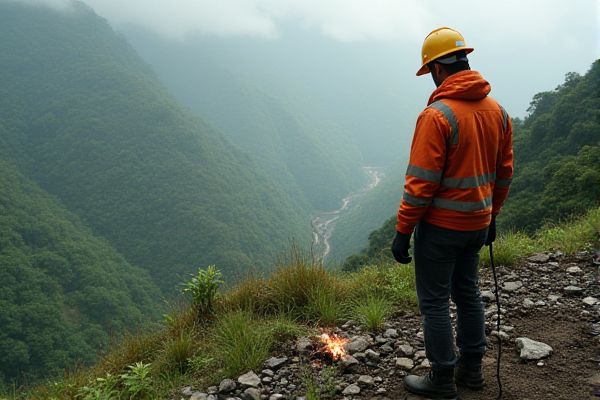
The Philippines offers various job opportunities for geologists, particularly due to its rich mineral resources and diverse geological formations. Common sectors hiring include mining and extraction, environmental consulting, and government agencies focused on natural resource management. Universities and research institutions also seek geologists for academic roles or research projects concerning geological hazards and climate change impact. Networking within industry-specific associations can enhance job prospects and provide valuable connections in the geological community.
Job Description
Geologist jobs in the Philippines involve the study of Earth's materials, processes, and history to assess natural resources and environmental impact. Professionals in this field conduct field surveys, collect data, and analyze geological samples to guide mining operations, construction projects, and environmental conservation. Opportunities exist in various sectors, including mining companies, environmental agencies, and governmental organizations, addressing the unique geological formations of the Philippine archipelago. Developing skills in geospatial analysis and environmental assessment can enhance your employability in this growing sector.
Requirement
Geologist jobs in the Philippines typically require a Bachelor's degree in Geology or a related field. Employers often seek candidates with experience in geological surveying, data analysis, and environmental assessment. You may also need proficiency in geological software and fieldwork techniques to effectively conduct research and analysis. Certifications such as a Professional Geologist (PG) license enhance your employability in this competitive job market.
Salary and Perks Expected
Geologist jobs in the Philippines offer competitive salaries, typically ranging from PHP 25,000 to PHP 70,000 per month, depending on experience and specialization. Entry-level positions may start lower, but opportunities for advancement and higher pay are prevalent with experience and further education. Many companies provide perks such as health insurance, performance bonuses, and opportunities for fieldwork, which can enhance your professional growth. The robust mining and environmental sectors in the Philippines contribute to a steady demand for skilled geologists, ensuring a promising career path in this field.
Similar Job Names
- Geologist
- Environmental Geologist
- Petroleum Geologist
- Hydrogeologist
- Mining Geologist
- Engineering Geologist
- Geophysicist
- Geo-Environmental Consultant
- Geotechnical Engineer
- Paleontologist
- Mineralogist
- Geological Surveyor
- Seismologist
- Geochemistry Specialist
- Soil Scientist
- Stratigrapher
- Petrologist
- Geospatial Analyst
- Remote Sensing Specialist
- Exploration Geologist
Job Expectation Concept
Geologists in the Philippines are expected to conduct field studies, analyze geological data, and assess natural resources. Your role may involve working closely with mining companies, government agencies, and environmental organizations to ensure sustainable practices. Proficiency in software tools for geological modeling and data analysis is crucial for accurate reporting and decision-making. Strong communication skills are also essential, as you will need to present findings and recommendations to various stakeholders.
Career Advantage and Weakness
Geologist jobs in the Philippines offer significant career advantages, particularly due to the country's rich natural resources, including minerals, oil, and gas. The demand for skilled geologists is increasing, driven by ongoing exploration and environmental assessments required in industries such as mining and construction. However, challenges exist, including potential difficulties in working in remote locations and the need for continuous education to keep pace with advancements in geological technologies. Understanding the local regulatory environment and sustainability practices is crucial for success in this field, ensuring that you remain competitive in the job market.
Important Thing Must Know
Geologist jobs in the Philippines offer diverse opportunities in various sectors, including mining, environmental consulting, and energy. The country's rich natural resources and geological diversity attract geologists to study everything from mineral deposits to volcanic activity. Employers often seek candidates with strong analytical skills and a background in geology or related fields. Geographic Information Systems (GIS) expertise can enhance your job prospects in this competitive field. Networking within professional organizations can also provide valuable insights and connections to advance your career as a geologist in the Philippines.
Alternative Career Options
Geologists in the Philippines have versatile career options beyond traditional roles in mining and petroleum industries. Opportunities exist in environmental consulting, where you can contribute to projects focused on sustainability and natural resource management. Additionally, roles in government agencies such as the Mines and Geosciences Bureau offer chances to influence policy and resource conservation. Academic positions in universities provide avenues for research and education, allowing you to shape the next generation of geoscientists.
Companies List
- Philex Mining Corporation
- Benguet Corporation
- Atlas Consolidated Mining and Development Corporation
- DMCI Holdings, Inc.
- Philippine Gold Processing & Refining Corp.
- OceanaGold Philippines, Inc.
- Nickel Asia Corporation
- Manila Mining Corporation
- Greenstone Resources Corporation
- San Miguel Corporation's mining division
List of Ideal City
Manila, as the capital city, offers numerous opportunities for geologists due to its proximity to various research institutions and universities. Davao City, known for its rich biodiversity and geological formations, provides a vibrant job market for professionals specializing in environmental geology. Cebu, with its booming tourism and real estate sectors, often requires geological assessments for infrastructure projects. Bacolod, recognized for its agricultural land and natural resources, also presents potential roles in geotechnical engineering and resource management.
 jobs-philippines.com
jobs-philippines.com